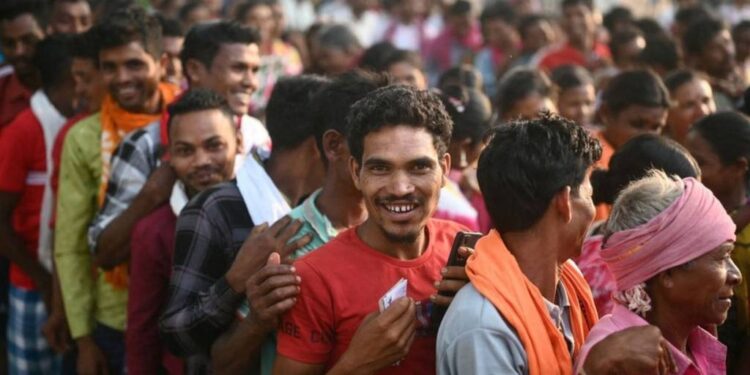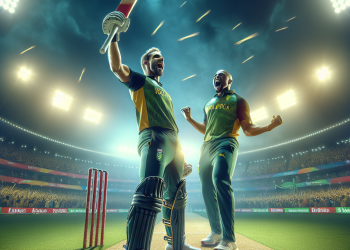India is set to vote in the world’s biggest election, paving the way for an enormous democratic process where nearly one billion individuals are eligible to cast their votes over slightly more than six weeks.
Prime Minister Narendra Modi is standing for a rare third term in power, against an alliance of opposition parties that are seeking to unseat him.
Here is a look at how the world’s most populous country votes in the world’s largest democracy.
Population
Home to more than 1.4 billion people, about 969 million are eligible to cast their vote in the upcoming election — more than the populations of North America and the European Union combined.
Approximately 12% of the global population is expected to participate in the upcoming elections, driven by various concerns such as unemployment, welfare benefits, infrastructure, and the preservation of democracy. The election commission reported a significant rise in the number of registered female voters by 40 million compared to the last election in 2019, along with an increase of over 20 million voters aged between 18 and 29.
In this election, there are over 2,600 registered political parties. According to the majority of analysts and political surveys, the frontrunner is Narendra Modi, the Prime Minister of India, and his Bharatiya Janata Party (BJP), which has been in power since 2014 and is now seeking a third term.
Over the past decade, the Hindu nationalist policies of Modi and the BJP government have significantly influenced the political and cultural landscape of the country. This shift has moved India away from the secularism that is protected by the constitution, which ensures equality for all religions, and towards a rule that favors the Hindu majority.
Considering that India is the world’s most populous country and has one of the fastest-growing economies, the outcome of this election will also have international implications. India has become an increasingly important partner for countries such as the UK, the US, and France. These nations have recently signed agreements and pursued closer relationships with Delhi as a way to balance China’s influence.
Why Is The BJP Likely To Win?
The BJP, under Modi’s leadership, currently holds a solid parliamentary majority following its success in the 2019 election, securing 303 seats. When factoring in votes for its coalition partners, the total reaches 352. In the upcoming election, the party is extremely optimistic about its chances and is setting a goal for the BJP-led alliance to secure over 400 seats in the 543-seat parliament.
The BJP’s dominance is attributed to Modi’s widespread appeal and the centralization of power during his tenure. This includes a sophisticated party structure and innovative utilization of technology and social media to connect with voters. Additionally, the BJP has a strong grassroots network of supporters and volunteers, along with a powerful propaganda apparatus that spreads information through various social media platforms like WhatsApp, despite facing criticism for spreading misinformation during past elections.
It is also considerably richer than any other party, and has far greater financial resources to spend on elections, spending an estimated almost 418bn rupees in the 2019 election.
Nonetheless, while a BJP win is seen as highly probable, questions still remain about whether the party will be able to maintain the same overwhelming parliamentary majority it has enjoyed, with a few crucial states still up in the air and simmering discontentment over unemployment and inflation.
Will The World’s Biggest Election Be Fair?
Throughout the 75 years since gaining independence, India’s electoral processes have typically been regarded as transparent and just, despite occasional allegations of vote-buying. Voter turnout has consistently been high, reaching 67% in 2019, and the election outcomes have generally been accepted without significant dispute.
However, during its tenure in the last ten years, the Modi government has faced criticism for implementing policies that some argue tilt the electoral playing field unfairly in favor of the BJP.
Under Modi, media watchdogs have documented an erosion of media freedom and crackdowns on independent and critical media, meaning much of India’s coverage is pro-Modi, and the independence of the judiciary is also seen to have come under attack.
The recent arrest of Kejriwal and the freezing of Congress’s accounts has prompted the US, Germany, and the UN to make statements calling on India to make sure the election processes are “free and fair”.
One of the key bodies alleged to be under the thumb of the government is the Election Commission, the watchdog that is tasked with maintaining the impartiality of the polls and ruling on any campaign violations.
The government recently changed the rules so it now has majority control over Election Commission appointments. Not long after, one of the commission’s panel abruptly resigned without explanation, leaving the government free to pick the replacement.
Meanwhile, opposition parties have also raised repeated questions over the lack of transparency and possible hacking of electronic voting machines, but no allegations of manipulation have been proved.
What Could A Modi Third Term Mean For India?
There is a widespread belief that if the BJP manages to retain or surpass its strong majority, it will swiftly proceed with implementing the core policies of its Hindu nationalist agenda. This would result in a heightened polarization of society, similar to what occurred in 2019.
READ MORE: Dr Arikana, Enabulele, Others Team Up For Ubuntu Awakening Summit
One of the key aspects of this agenda is the implementation of a uniform civil code throughout the country. However, there are concerns that this move could undermine the rights of religious and cultural minorities to freely practice their beliefs.
Furthermore, there are apprehensions that a third-term BJP government might lead to increased authoritarianism and a further decline in India’s democratic values, which has been the trend since Modi assumed power.
Nevertheless, the primary concern among opponents is that if the BJP achieves its goal of winning 400 seats, it would possess a significant majority to amend India’s secular constitution and officially establish the nation as a Hindu-first country.










